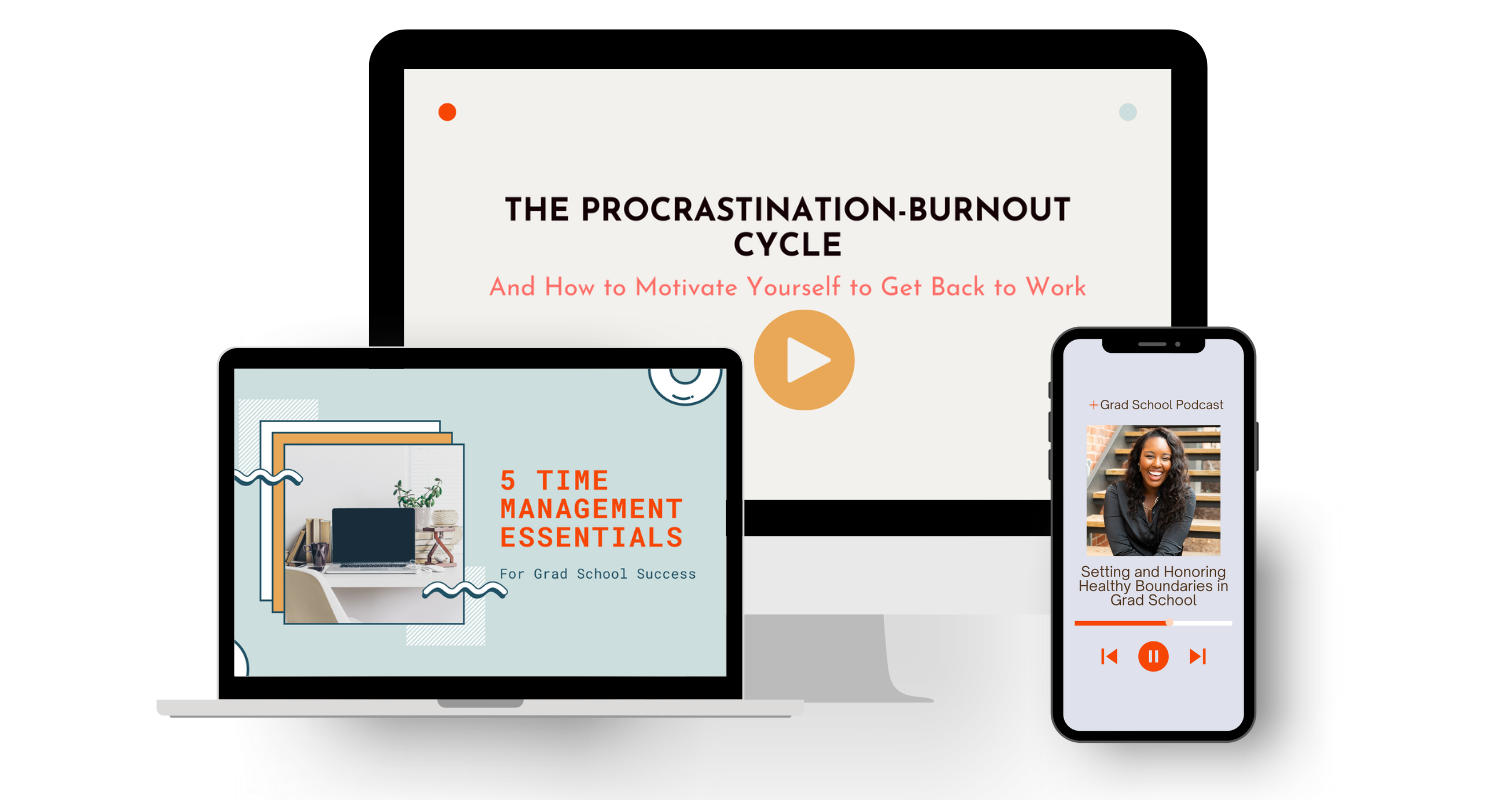The Grad Student’s Guide to Managing a Full Course Load Without Burning Out
Grad school is a whole new world—one filled with exciting opportunities, intellectual challenges, and the chance to dive deep into your field. But it also comes with its fair share of stress. Balancing coursework, research, teaching, and personal life can quickly become overwhelming. Before you know it, you’re running on caffeine and sheer willpower, staring burnout in the face.
Sound familiar? If you’re a grad student struggling to manage your full course load without losing your mind, you’re not alone. I’ve been there, and I’ve helped many other grad students navigate these same challenges. The good news is that burnout doesn’t have to be part of your grad school journey. With the right strategies, you can stay on top of your workload and take care of yourself.
In this guide, I’m going to share practical tips for managing your course load, stories from my own grad school experience, and strategies from my Grad School Success System to help you thrive—without burning out.
Why Burnout is So Common in Grad School
First, let’s talk about why burnout is so common in grad school. Unlike undergrad, where you might have had more structured schedules and clearly defined deadlines, grad school is a different beast. You’re not just attending classes; you’re balancing multiple roles—student, researcher, maybe even teacher or employee. And the expectations? They’re much higher.
Grad students often feel pressure to excel academically while juggling a heavier workload, contributing original research, and preparing for their future careers. Add in the fact that many students struggle with imposter syndrome, and you’ve got a recipe for burnout.
I remember my first year in grad school when I was trying to do it all—keep up with my coursework, impress my professors, dive into my research, and somehow have a social life. I was exhausted. It felt like no matter how hard I worked, I was always behind. It wasn’t until I started implementing real strategies for time management and self-care that things turned around.
Here’s what I learned (and what you can apply to your own journey).
Hi! I'm Dr. Toyin Alli, Math PhD and founder of The Academic Society, where I support grad students with their time management, productivity, and well-being.
1. Prioritize Tasks with Purpose
One of the biggest mistakes grad students make is trying to do everything at once. With multiple classes, projects, and commitments, it’s easy to fall into the trap of thinking you need to tackle everything on your to-do list right away. But here’s the truth: Not all tasks are created equal.
Take a step back and ask yourself, “What tasks will have the most impact?” Are there deadlines coming up that you can’t afford to miss? Are there assignments that carry more weight toward your final grade? What about projects that could help you build relationships with professors or peers in your field?
When I was in grad school, I often wasted time on tasks that weren’t as important, just because they felt easier or more manageable in the moment. I’d spend hours perfecting a presentation for a class while neglecting a major research project with a looming deadline. It wasn’t until I started prioritizing tasks based on their importance and impact that I started feeling more in control of my workload.
How to apply it:
Start by creating a “priority list” for each week. Identify the top 3-5 tasks that will move the needle the most and focus on those first. In my Time Management Essentials masterclass, I dive deep into strategies for prioritizing your tasks so you can stay productive without feeling overwhelmed. With the right system in place, you’ll always know what to focus on next.
2. Break Down Big Projects into Manageable Steps
Grad school is full of big projects—research papers, presentations, lab work, and more. One of the reasons these projects cause so much stress is that they feel huge and overwhelming. It’s easy to procrastinate on big tasks because you don’t even know where to start. But the longer you wait, the more the pressure builds, and before you know it, you’re pulling an all-nighter and burning out in the process.
I remember when I was working on my dissertation, the sheer size of the project made it hard to start. I kept putting it off, telling myself I’d get to it “later.” But “later” never came. Finally, I realized that the only way to tackle a big project was to break it down into smaller, manageable steps. Instead of thinking about the dissertation as one massive task, I focused on completing one section or even one paragraph at a time.
How to apply it:
For every big project you have, break it down into smaller tasks with mini-deadlines. Instead of saying, “I need to finish this paper by the end of the month,” set goals like, “I’ll write the introduction by Friday,” or “I’ll collect research for Chapter 2 by the end of next week.” This makes the project feel less overwhelming and keeps you on track. In my Grad School Success System, I teach a step-by-step method for managing big projects so you never feel like you’re falling behind.
3. Set Boundaries and Protect Your Time
One of the biggest reasons grad students burn out is because they don’t set boundaries. In grad school, it’s easy to feel like you should be working all the time. There’s always more research to do, more reading to catch up on, or another assignment to finish. But working 24/7 is a surefire way to burn out fast.
I remember working with a grad student, let’s call her Emily, who struggled with this during her first semester. She would spend every waking hour working on her classes, never taking time for herself or her personal life. By midterms, Emily was completely burnt out and could barely keep up with her assignments. It wasn’t until she started setting boundaries—like not working after 8 p.m. and taking weekends off—that she began to feel more balanced.
How to apply it:
Set clear boundaries around your work and personal time. Decide when you’ll stop working each day and stick to it. Schedule time for self-care, hobbies, and socializing, just like you would for class or work. In my masterclass on Setting and Honoring Healthy Boundaries, I show you how to create a schedule that balances your academic and personal life, so you can stay productive without burning out.
4. Create a Weekly Schedule and Stick to It
If you don’t plan your time, it’s easy for grad school to consume your entire life. Without a clear plan for how you’ll spend your days, you might find yourself scrambling to meet deadlines at the last minute or wasting time on tasks that aren’t important.
I used to think that I could just “go with the flow” and figure things out as I went along, but that approach only led to stress and last-minute cramming. Once I started creating a weekly schedule, everything changed. I blocked out time for each class, project, and commitment, and made sure to include time for breaks and personal activities.
How to apply it:
At the beginning of each week, create a schedule that outlines your commitments. Block off time for coursework, research, teaching, and any other tasks you need to complete. Be realistic about how much time each task will take, and don’t forget to schedule in breaks. My Time Management Essentials class includes a detailed guide on how to create a weekly schedule that works for your specific needs as a grad student.
5. Ask for Help When You Need It
Grad school can feel isolating, but you don’t have to go it alone. Whether you’re struggling with coursework, research, or just balancing everything, it’s important to ask for help when you need it. Too many students try to tough it out on their own, thinking they should be able to handle everything by themselves. But that mindset only leads to more stress and burnout.
I’ll never forget the time I was stuck on a particularly challenging research problem. I spent weeks trying to solve it on my own, too embarrassed to ask for help. But once I finally reached out to my advisor, he helped me see the solution in just a few minutes. I learned that asking for help doesn’t mean you’re weak—it means you’re smart enough to seek support when you need it.
How to apply it:
Don’t be afraid to reach out to your professors, classmates, or advisors when you’re feeling stuck. Whether it’s clarification on an assignment or advice on how to manage your workload, seeking help can save you time and energy in the long run. In my Procrastination-Burnout Cycle class, I emphasize the importance of building a support network and seeking accountability to stay on track.
Final Thoughts: Thrive Without Burning Out
Managing a full course load in grad school is no small feat, but it doesn’t have to lead to burnout. By prioritizing your tasks, breaking down big projects, setting boundaries, and asking for help, you can stay on top of your workload and still have time for yourself.
If you’re ready to take control of your grad school experience, check out my Grad School Success System. It’s designed to give you the tools and strategies you need to manage your time, stay productive, and protect your well-being—all while excelling in your studies.
Introducing
The Grad School Success System
The Grad School Success System is your toolkit for managing time, beating procrastination, and setting healthy boundaries, so you can finally get things done…
without sacrificing your well-being.
Let’s make grad school a time of growth and success, not stress and burnout.





